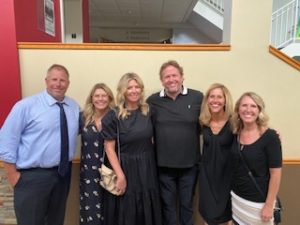


Today’s reading: Acts 4
When I encounter something that has a significant, positive impact on my life I have a tendency to talk about it a lot.
Case in point #1 – when I started Crossfit in 2009 I did exercises I never thought I could do and found muscles I never knew I had. I couldn’t stop talking about it and trying to get everyone else to try it with me. In fact, 12.5 years later I am still going and still talking about it. (I can see B.J. rolling his eyes as he reads this. Please do not ask me about Crossfit when he is around. He is not a “believer” and is very tired of listening to it after all these years…hehehe!)
Case in point #2 – my favorite store is Aldi. Yes, you have to have a quarter to get a cart and yes, you have to buy grocery bags if you don’t bring your own. But it is still the fastest store in town. Even at its busiest time, I can be in and out of that store with a cart full of food in less than 25 minutes. Their produce is great because they turn it over fast. While you can’t generally buy name brands at Aldi, I’m pretty sure many of their “off” brands are the made in the same factory and just have a different name stamped on the label. (Lovin’ Fresh Italian bread looks and tastes exactly like Brownberry.) Best of all, everything costs less! (Again, B.J. is tired of hearing about Aldi, although occasionally I get him to go there with me.)
Case in point #3 – Aquaphor is a miracle ointment. When Freddy was born, I can’t remember who told me about this supposedly fantastic product called Aquaphor, but I know I was skeptical. Do you know how expensive that stuff is? All it took was a teething baby with a red butt and I was willing to pay $1/ounce! Seventeen years later, I have Aquaphor stashed everywhere – in my bathroom drawer, in my purse, in my desk. While I don’t need a cure for diaper rash anymore, I still use it every day on every sort of skin disorder – chapped lips, dry skin, cuts, burns, etc. (Feel free to ask B.J. his thoughts about Aquaphor, he is a “believer”…or at least he uses it all the time too!)
The impact these 3 things have had on my life is measurable – I can see the muscles, count the savings and feel the relief. While I might drive you nuts with my chatter, you can’t deny the results.
Acts 4, our scripture for today, has a similar slant. Peter and John had spent the last 3 years with Jesus. They watched him turn water to wine, give sight to the blind, heal the sick, and ultimately give his life to take away the sins of the world. Now that he was gone they couldn’t stop talking about the impact he had on their lives. Even though he was no longer with them in person, through the power of the Holy Spirit, the disciples were able to perform miracles including healing a lame beggar (Acts 3). They wanted everyone to know the love of Jesus and experience the same hope they knew.








